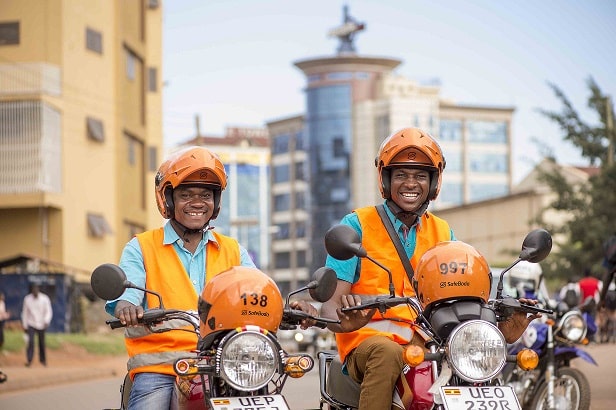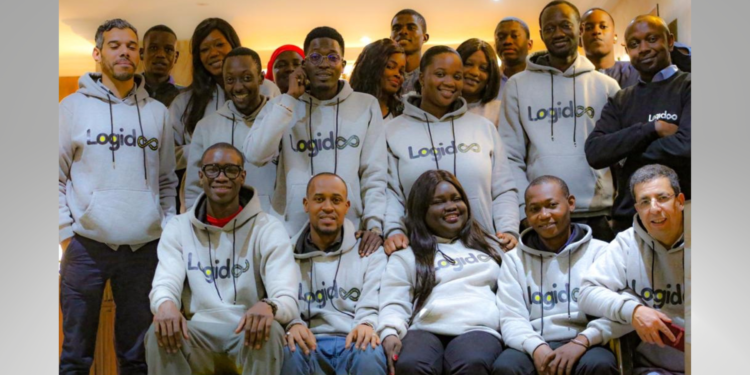Not many years have passed since Ricky Rapa Thomson left the Boda Boda (a widely adopted name for commercial motorcycles in most parts of East Africa) business as a rider to take on a major challenge Ugandans experience in the public transportation industry.
His big play was towards ensuring sanity in the highly unorganised and hazardous Boda Boda industry within Uganda’s most populous city, Kampala. Being the young and inexperienced entrepreneur he was at the time, the odds didn’t look to be in his favour.
Ironically, the startup he founded in 2014 recently announced a major expansion to Nairobi, Kenya some weeks back.
The journey of Uganda’s first motorcycling e-hailing service startup, SafeBoda, as it is called, is not about Ricky or the expansion plan. Rather, it is about a struggle to break barriers and a quest to make life more meaningful to Ugandan commuters.
Uganda’s ‘silent killers’
While motorcycling in developed countries is predominantly used for fun, sports and outing, it is a widely adopted means of public transport in Africa.
However, these Boda Bodas mainly operated by the youth as a means of public transport have been responsible for many accidents in Uganda. Hence they are dubbed as “Uganda’s silent killers”.
A United Nations special report about safety on Ugandan roads shows that at least 10 people die daily on Kampala roads due to Boda Boda accidents.
According to the Ugandan annual crime and traffic/road safety report, about 3,343 road deaths were registered in 2011. Although the World Health Organisation has estimated a figure that more than doubles that, the major casualties in both are still Boda Boda related.
While Boda Bodas are creating alternative avenues for youth employment, the impact of accidents is placing huge strains on the Uganda health budget.
In neighbouring countries like Rwanda, the government enforces regulations to organise Boda Boda riders. Riders have to wear a safety helmet and likewise ensure that passengers wear one too.
The authorities in Kampala have supposedly instituted same regulations, including mandatory registration of drivers, first-aid training, reflector jackets and helmets. But unlike Rwanda, where things seem to work, there are still festering issues with implementation and due processing in Uganda.
These incidents couldn’t have better informed the need for a better and effective organisation of the Boda Boda sector in Uganda.
Humble beginnings
Ranked 15th in Africa, Internet penetration in Uganda is 31.3%. Even though this is heartwarming considering the educational barrier in Ugandan, the cost is bound to cripple adoption.
The cheapest amount of money you can spend on data is 500 Ugandan shillings ($0.13) and that only gets you 50MB. Considering this barrier, one wonders how SafeBoda, with its e-hailing motorcycle service, had fared. For what it’s worth, Ricky couldn’t have possibly done it by himself.
“As a Boda Boda rider, I bought a second helmet for my passengers and adhered strictly to a number of safety checks. Doing this invariably grew my customer network beyond what myself as a single person could provide service for,” says Ricky.
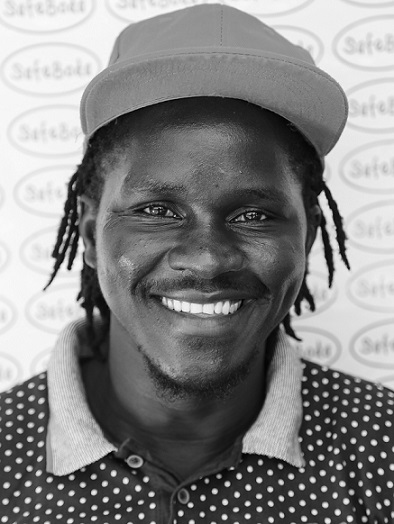
Before long, he came up with the idea of recruiting more riders like himself on the street and giving them the required training and equipment so that they could become more trusted. But he still had the same challenge of not being able to deal with expansion.
He then teamed up with Maxime Dieudonne (a Belgian) and Alastair Sussock (hails from the UK) whom he both met while still a Boda Boda rider.
Both Maxime and Alastair had previously worked in Rwanda, where the Boda Boda system looked more organised. From drawing expertise and experience together, they built not just an app but a full-blown business of motorcycling e-hailing within Uganda.
And it’s quite a straightforward process getting a ride.
“When passengers request for a ride, it sends out a pin within a 1-kilometre radius and sometimes 500 metres depending on peak time. The riders within the area receive the pin and the first to accept the pin goes to pick the user,” says Ricky.
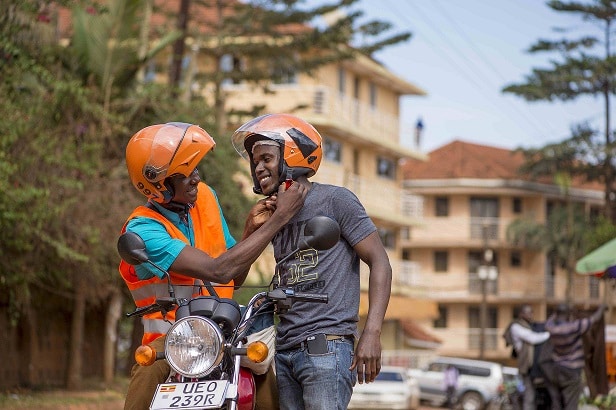
Fares are calculated based on time and distance and at the end, both driver and passenger are able to see the amount from the app. Recent upgrades have further opened up a pairing option where a passenger can simply walk up to a SafeBoda rider and key in the rider’s helmet number into their app to begin a ride.
Revenue model
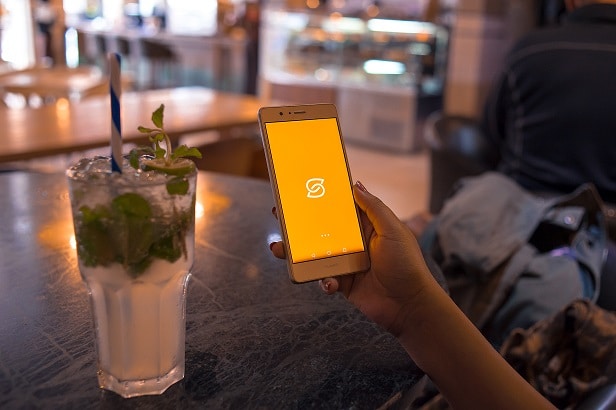
Making Boda Bodas as easy to hail from just an app is an attractive proposition altogether. In Uganda however, a lot of people are still used to walking down the street and stopping a Boda Boda.
For a startup like SafeBoda, this could contribute to revenue losses. This however is more of a cultural problem than pricing.
“From a price point, we are definitely more affordable than the ordinary Boda Boda on the streets of Uganda,” Ricky maintains.
Perhaps there is truth to this. Fares for local Boda Bodas are usually determined under arbitrary conditions. On the other hand, SafeBoda in terms of pricing has managed to create a certain standard that is comfortable for both the rider and customer.
Presently, cost per minute is 50 Uganda shillings ($0.013), while the cost per kilometres is about 700 shillings ($0.19). As its own commission, SafeBoda retains 15% of the total cost of a single ride. While the path to profitability is a long shot, it’s easy to see where growth is coming from.
The app sees over 40,000 rides daily in Uganda’s central business district. And by expanding into a new market it has proven the business.
New prospects
In expanding to Kenya, SafeBoda will be welcoming new challenges. More so because other e-ride hailing oriented business have tried Kenya but failed.
Rick is positive about SafeBoda chances. Back home, they have competition in Uber and Taxify which launched their motorcycling ride-hailing services in March and April this year respectively. However, SafeBoda’s connection with the local environment has allowed it ace through competition. Going to Kenya, there is no such luxury.
“If we can take the value of safety, convenience and trust that we have used here in Kampala, we see an opportunity to replicate the same thing in Nairobi.”
In a way, Nairobi still looks comparable to Uganda. Nairobi also has Boda Bodas, but they are not as popular. A large number of people are using the internet in Kenya and there are the similar festering problems of traffic congestion and passenger safety concerns.
“This element sort of creates a perfect ecosystem for Safeboda,” affirms Rick.
In terms of milestones, the goal is to conquer East Africa then expand across Africa. But as the competitive landscape keeps changing, SafeBoda will have to come with bigger plans for these markets.
At the moment SafeBoda is still a startup and its biggest investing partner is the Shell Foundation.

